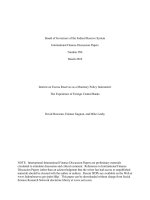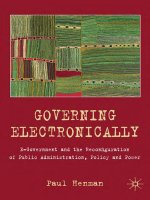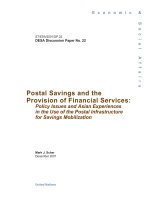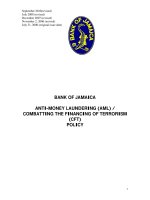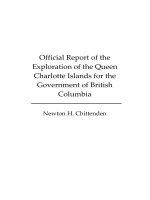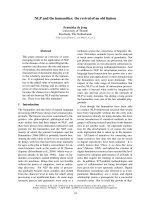Thatcher diplomacy the revival of british foreign policy
Bạn đang xem bản rút gọn của tài liệu. Xem và tải ngay bản đầy đủ của tài liệu tại đây (14.78 MB, 288 trang )
Free ebooks ==> www.Ebook777.com
www.Ebook777.com
Free ebooks ==> www.Ebook777.com
THATCHER'S DIPLOMACY
www.Ebook777.com
CONTEMPORARY HISTORY IN CONTEXT SERIES
Published in association with the Institute of Contemporary British
History
General Editor: Peter Catterall
Other titles include:
Peter Catterall and Sean McDougall (editors)
THE NORTHERN IRELAND QUESTION IN BRITISH POLITICS
Harriet Jones and Michael Kandiah (editors)
THE MYTH OF CONSENSUS? New Views on British History,
1945-64
Wolfram Kaiser
USING EUROPE, ABUSING THE EUROPEANS: Britain and
European Unity, 1945-63
Thatcher's Diplomacy
The Revival of British Foreign Policy
Paul Sharp
Associate Professor of Political Science
University of Minnesota
Duluth
ICBH
in association with
INSTITUTE OF CONTEMPORARY BRITISH HISTORY
Free ebooks ==> www.Ebook777.com
First published in Great Britain 1997 by
MACMILLAN PRESS LTD
Houndmills, Basingstoke, Hampshire RG21 6XS and London
Companies and representatives throughout the world
A catalogue record for this book is available from the British Library.
ISBN 0-333-65842-6 hardcover
First published in the United States of America 1997 by
ST. MARTIN'S PRESS, INC.,
Scholarly and Reference Division,
175 Fifth Avenue, New York, N.Y. 10010
ISBN 0-312-16440-8
Library of Congress Cataloging-in-Publication Data
Sharp, Paul, 1953Thatcher's diplomacy : the revival of British foreign policy /
Paul Sharp.
p. cm. — (Contemporary history in context series)
Includes bibliographical references and index.
ISBN 0-312-16440-8 (cloth)
I. Great Britain—Foreign relations—1945- 2. Conservative Party
(Great Britain)—History. 3. Thatcher, Margaret. I. Title.
II. Series.
DA589.8.S53 1996
327.41 '009'048—dc20
96-28748
CIP
©Paul Sharp 1997
All rights reserved. No reproduction, copy or transmission of this publication may be made
without written permission.
No paragraph of this publication may be reproduced, copied or transmitted save with
written permission or in accordance with the provisions of the Copyright, Designs and
Patents Act 1988, or under the terms of any licence permitting limited copying issued by
the Copyright Licensing Agency, 90 Tottenham Court Road, London W1P 9HE.
Any person who does any unauthorised act in relation to this publication may be liable to
criminal prosecution and civil claims for damages.
The author has asserted his right to be identified as the author of this work in accordance
with the Copyright, Designs and Patents Act 1988.
This book is printed on paper suitable for recycling and made from fully managed and
sustained forest sources.
10
9 8 7 6 5 4 3 2
06 05 04 03 02 01 00 99 98
Printed and bound in Great Britain by
Antony Rowe Ltd, Chippenham, Wiltshire
www.Ebook777.com
For my parents
Contents
General Editor's Foreword
ix
Preface
xi
Introduction
xiii
1
The Pursuit of Influence
1
2
Foreign Policy and the 1979 Election Campaign
22
3
The Thatcher-Carrington Partnership
30
4
The Diplomacy of Disaster: Losing the Falklands
50
5
Recovering the Falklands: the Diplomacy of War
64
6
Thatcher's US Policy I: the Diplomacy of Support
101
7
Thatcher's US Policy II: the Diplomacy of Interests
122
8
Thatcher's European Policy I: the Demandeur
141
9
Thatcher's European Policy II: Sovereignty and
Nationalism
160
10
Thatcher's Soviet Policy: Diplomacy at the Summit
183
11
Thatcher's German Policy: the 'Unambiguous Failure'
202
12
Thatcher's Statesmanship
225
Notes
247
Select Bibliography
264
Index
266
Free ebooks ==> www.Ebook777.com
General Editor's Foreword
Mrs Thatcher came to power in 1979 with impeccable Cold War
credentials, at a time when it was building towards a height, driven
by the deployment of SS-20s and the West's decision to respond,
both by corresponding missile deployments and increasing conventional military spending. The key decisions were taken during the
preceding Labour government, although Mrs Thatcher's more
robust approach to their implementation was undoubtedly welcomed in the Ministry of Defence. But this attitude reflected the
continuing certainties of the Cold War in which Britain's room for
manoeuvre in a divided world remained apparently strictly circumscribed. According to Paul Sharp, Thatcher, absorbed as she was by
her domestic programme and difficulties, did not give much
thought to appraising her foreign policy objectives and opportunities until the Falklands War in 1982. To some extent opportunities,
with the exception of Rhodesia-Zimbabwe, meanwhile remained
limited. Prospects for a thaw in East—West relations, for progress in
South Africa or for new initiatives in Europe while the budget issue
remained unsettled were not good.
By the time she fell from office, in contrast, she was arguably
putting her international activities above an underestimated threat
to her domestic political survival, being in Paris for the Conference
on Security and Cooperation in Europe on the night of the fateful
first leadership ballot. And it was on her foreign policy record that
she concluded her defence of her government in the no-confidence
debate that Labour then tabled. In the process she could look back,
as Paul Sharp shows, on some solid achievements, as well as some
significant failures. This book thus provides a valuable review of
what became an important career as an international stateswoman
at a time of great change.
The subject matter of that CSCE conference demonstrated that
the Cold War, so palpable when she came to office, was by the close
of her premiership in 1990 all but at an end. The structure of
international capital and its impact upon Britain following the
abolition of exchange controls in 1979, meanwhile also changed
dramatically. This, perhaps as much as membership of the European Community, was to erode the scope of national sovereignty
during Mrs Thatcher's years in Number Ten. But her response was
www.Ebook777.com
x
General Editor's Foreword
rather different from her European partners. Instead of seeking to
contain its effects by closer economic integration, she sought to
further it by pursuing liberalization of capital and services in Europe more widely. This reflected in part quasi-Cobdenite notions of
the merits of freer trade, both in economic and geopolitical terms.
But it also reflected, paradoxically, calculations that Britain's interests would nevertheless be better served by such developments,
certainly exemplified in the negotiation of the Single European Act.
She was able to pursue such aims in a world in which the
bipolarities she inherited were of diminishing importance. Increasingly there seemed instead to be scope for pursuing an alternate
vision of a liberal world economic order, in which states would have
greater play for following their own particular interests. Indeed, it
was the seductive promises of that liberal economic order, as much
as the resolution which she from the beginning brought to the
waging of the Cold War and continued to see as crucial to victory
in it to the end, that helped to undermine the bipolar world order
that had obtained since the 1940s. It is in this vision, founded upon
her potent combination of economic liberalism and political nationalism, that Paul Sharp sees Mrs Thatcher's distinctive contribution
to statecraft. In the process, though she may have started as something of an archetypal Cold Warrior, he argues persuasively that she
in fact deserves a place for her role in mapping out the international
politics of the post-Cold War era.
Peter Catterall
Institute of Contemporary British History
June 1996
Preface
This book is about foreign policy and diplomacy under Margaret
Thatcher. These are, as Lucky Jim might have called them, 'strangely neglected topics', because of the thrust of international studies
in recent years. Accordingly, I have deliberately tried to write an
old-fashioned book treating countries, their policies and their interests as real, the way most people, including Thatcher, continue to
think about them, while incorporating the insights of more systematic and more critical studies of foreign policy where these seem to be
useful. The result, I hope, is a work which, though not uncritical in
the details, makes a sympathetic assessment of what Thatcher and
others were attempting to do. A more sympathetic approach to the
predicaments of those to whom we give power and responsibility is
long overdue in international studies and the social sciences in
general, and this work may be viewed as both an attempt to help
redress the balance and make a measure of personal atonement in
this regard.
Many people have made this work possible. My thanks go first to
several members of Thatcher's governments for their willingness to
speak frankly about their role in and views of British foreign policy.
Members and former members of the British Foreign Service in
Ottawa, Chicago, New York, London and Ashburton were unfailingly helpful in providing me with interviews, information and
perspectives. Too many colleagues to mention individually also gave
great help, but I must single out two who at different times gave
critical support, Professor Geoff Berridge of the Centre for the
Study of Diplomacy at the University of Leicester and Professor
Peter Nailor, former Provost of Gresham College. Peter provided
the inspiration which led me into this field, and his death is a loss to
us all. Finally, I owe a debt of thanks to the University of Minnesota
for providing me with both the time and assistance to complete this
project.
Paul Sharp
XI
Introduction
In undertaking this study of Margaret Thatcher's contribution to
British foreign policy, I have two objectives in mind: to provide an
account of her statecraft; and to make an assessment of the claim
that she be regarded as an international statesman, someone who
has had a decisive impact, not merely on the foreign policy of her
own country, but on the conduct of international affairs in general.1
Remarkably, given her public persona, this is not an aspect of
Thatcher's political career which has received close scrutiny. Books
about her are generally of two sorts: political biographies and
studies of 'Thatcherism' - the set of principles about individuals,
markets and the state upon which she believed modern, liberal
democracies ought to be based. The biographies usually treat her
international career as a source of corroborating evidence for the
personal portrait, good or bad, which their authors wish to draw of
her, while studies of 'Thatcherism' treat it primarily as a domestic
phenomenon. Indeed, the relatively few books and articles which
have been written by academics on Thatcher and British foreign
policy have been at pains to emphasize both the minimal and the
uninnovative character of her contribution to its substance.
How is this sparse and generally unflattering treatment of her
international record to be explained? Its root cause is the predisposition which exists among students of international relations to
doubt that individuals can have a major impact on human affairs in
general and foreign policy in particular. The latter they see as the
product of complex bureaucracies functioning within increasingly
dense networks of interdependent economic and political relationships between countries. At the same time, however, these same
scholars see themselves as having to confront and debunk a powerful popular tradition in which world affairs are presumed to be
shaped by virtuosos possessing the vision to create new orders and
the guile to outwit their rivals. This 'great man (or woman)' tradition is one which politicians are quick to exploit, claiming powers
they do not possess and taking responsibility for fortuitous events
which they did not bring about. As a consequence, the scholars'
resistance to it is often fuelled by their reluctance to gild the lilies of
people who, together with their supporters, are quite capable of
undertaking this process themselves.
xiv
Introduction
Thatcher provides no exception to this tendency. One of the
reasons why she assiduously cultivated an international reputation
was to enhance her personal, political status, and she has suffered
accordingly. However, in Thatcher's case, it must be added that the
neglect is greater than usual because she is disliked. She is so
partly because of the controversial character of her domestic
agenda, one consequence of which was to alienate those who were
most likely to write about her foreign policy, namely British academics, and possibly because many people found it hard to accept a
woman wielding power in the way that Thatcher did. The principal
reason for this hostility, however, was the impression which
Thatcher often managed to convey that her political convictions,
right or wrong, had been reached with insufficient agony of the
soul. She either did not understand or she did not care about the
full implications of, for example, closing down coal mines or confronting the Argentinians. In short, while Thatcher might have
been involved in and, indeed, pivotal to some of the great events
of our time, it could be claimed that she lacked the greatness and
generosity of spirit, together with the real sense of history, possessed
by the members of the pantheon of statesmen which it was all too
clear she aspired to join.
These reasons for being reluctant to make an objective assessment of Thatcher's statesmanship no longer apply, and some of
them never did. Most easily dismissed is the argument that her
personality, in essence, disqualifies her from consideration as an
international statesman. Public affairs and private matters should
exist separately from one another. What matters, is whether or not
policies are correct and not whether their author is capable of
agonizing over all their consequences. Indeed, public displays of
private emotion would only make difficult policies harder to undertake. As to whether Thatcher actually did agonize over the convictions to which she adhered in public, that it is nobody's business
but hers and her family's. Almost as easily discounted is the claim
that she used international affairs to build her own reputation.
The fact that politicians exploit their international careers in
this way does not preclude the possibility that they still may be
international statesmen. Certainly, the possibilities realized by
modern communications, together with the demands of modern
democracy, have made it both easier and more necessary to create
and project political images, such as the powerfully attractive one of
being an international statesman. It would be a poor diplomatic
Introduction
xv
historian, however, who claimed that Churchill and Roosevelt, or
even Bismarck and Metternich, belonged to an era in which pure
statesmanship, divorced from the sordid business of constructing a
personal political image, prevailed. Indeed, image-building, inspiring confidence or deference among those with whom one worked,
was always an ingredient of successful statesmanship. Now that
Thatcher is out of office, therefore, the question to ask is not
whether she used international affairs to gild her own lily, but, in
so doing, what did she accomplish.
To ask it, of course, is to confront the original problem, the
disposition against the twin ideas of the great statesman and virtuoso diplomacy. Does a study of the record of an individual, even a
powerful one like Thatcher, contribute to a true understanding of
international relations, an accurate explanation of why things, or
some things, happen in the course of them, or a prescription for the
conduct of foreign policy? When asked, in a now famous interview,
what she had changed, Thatcher replied 'everything'. Her response
was indicative, both of her personality and her belief in the individual or, at least, certain individuals. It was also untrue, and elaborations of the constraints under which policy is made by modern
governments rightly make us highly sceptical of such claims.
However, they should not be allowed to exclude the possibility a
priori that particular individuals, in certain circumstances, can
make critical, or even decisive, contributions to the course of events.
Indeed, if the constraints on policy-makers are now greater than
they used to be, then the ability of certain individuals to override
them should be regarded as all the more remarkable and worthy of
investigation.
Upon what, then, does Thatcher's international reputation rest?
Three elements stand out: her relationship with Ronald Reagan
and the strong support she gave to his Cold War policies; the
successful war to recover the Falkland Islands; and her opposition
to' the European Community's (EC) plans for further integration.
On the first, it may be said that Thatcher enabled Britain to play a
long-established supporting role more effectively. By the second, she
provided the country with a brief moment of modest glory. On the
third, the central issue of British foreign policy, she devised a course
which was both controversial and personally damaging. At best, it
might be said that Thatcher pursued business as usual with a little
more vim and vinegar, encouraging the country to stop exaggerating
its 'impotence' and to start seeing itself as it really was:
xvi
Introduction
... a middle power, given unusual influence by virtue of its historical distinction, skilled diplomacy and versatile military forces.3
At worst, she rallied national morale, which was valuable, but in a
way which ultimately proved to be counterproductive.
This modest assessment, which uses Thatcher's own words from
her memoirs, is shared by even many of the experts and professionals who are favourably disposed towards what Thatcher
attempted. As it stands, it scarcely yields a record upon which to
base a claim to international statesmanship. It is, however, both an
inaccurate and overly modest assessment. It is inaccurate in that, in
her years in office, Thatcher did not restore the confidence to
reassert and exercise British influence. She did not, because she did
not need to. One of the great success stories of postwar Britain was
its ability, in the much-denied words of a recent foreign secretary,
'... to punch above its weight' abroad no matter, by implication,
how bad things got at home. In fact, this was a priority which
Thatcher came to doubt, for, all too often, in her judgement, British
influence was preserved at the expense of British interests.
Thatcher sought to redress this imbalance. She did so, principally, by rejecting the assumed consequences of what Wallace and
Tugendhat have called the 'structural contradiction' facing all modern political communities. Most people live in and feel they belong
to national political communities whose independence they value,
and nearly everyone else aspires to do so. Everyone, however,
increasingly depends on an international and integrated economic
system to produce the things they want.4 It is axiomatic for most
foreign policy academics and professionals that the relationship
between independence and prosperity possesses the qualities of a
'zero-sum' game. To maintain prosperity entails a country entering
into commitments which reduce its political independence, while
defending the latter has an economic cost. It is also widely assumed
that the latter course of action is impractical because of the power
of international capital, and undesirable because of the materialist
and consumer priorities of most people.
Thatcher was able to reject this portrayal of the relationship
between prosperity and independence because she was both an
economic liberal and a political nationalist, a rare combination in
both political and intellectual life, although as common as anything
on the high street. The economic consequences of this combination
are well known. At home, Thatcher sought to free the operations of
Introduction
xvii
the market from government intervention, while abroad she supported measures to open the international economy and resisted
those designed to achieve state-managed regional integration. The
political consequences, however, for British foreign policy have
received far less attention. Instead of seeking to transform the
British state into a modest and practical vehicle for managing the
common external affairs of the bourgeoisie, Thatcher tried to
restore it as a liberal great power, committed to a few vital international principles and its own, independently defined, national
interests.
The combination of political nationalism and economic liberalism at the heart of Thatcher's statecraft has caused analysts a great
deal of trouble. Her more virulent political opponents regarded it
simply as a populist fraud. Those on the left believed Thatcher to
be a flag-waver who was actually prepared to sell her country to the
highest bidder. Those on the right saw her as willing to play the
nationalist card and damage the country's long-term economic
prospects if she believed this would help her get re-elected. Most
analysts, however, simply regarded the combination as a prescription for incoherence made possible by Thatcher's inability to see the
inherent tension which existed between the two. She might claim to
be an economic liberal, but she was flawed by a most unliberal and
emotional attachment to her own understanding of Britain's past. In
the critics' view, Thatcher either hankered for, or sought to exploit,
those who hankered for a world of independent states in which
Britain played a leading role.
In fact, it was those who posited the irreconcilability of the
tension between prosperity and independence who were soon to
be exposed to the charge of living in the past. The world to which
they claimed Thatcher had failed to adjust was one of increasing
levels of economic integration directed and regulated by multilateral and supranational agencies. Their mistake was to see this
process as almost entirely resulting from the dynamics of welfare
economics and technology, seasoned by a sense among policy elites
of the failures of nationalism and the desire for a better, more
peaceful world. What they failed to take into account was the extent
to which this order had been brought about as a matter of policy by
the superpowers. The United States (US), in particular, had worked
for such a system in Europe, utilizing both its material and ideological predominance, at the start of the Gold War, and the discipline
of that great contest had done much to keep the system in place.
xviii
Introduction
With the decline of the Cold War and ultimate collapse of the
USSR, many of the constraints and incentives which kept this
system in place also began to disappear, greatly expanding the
opportunities for more autonomous action of many states, but most
notably the European great powers.
Thatcher was the first to discover these opportunities or, more
accurately, have some of them thrust upon her by the Falklands
War in 1982. Until then, she had not been interested in foreign
policy, but provided with confidence and status by that success, she
applied her assumptions and preferences about political nationalism
and economic liberalism to British foreign policy with great, if
imperfect, success. It is upon this discovery and her willingness to
act upon it, that Thatcher's claim to being regarded as an international statesman rests. Her vision of an international order sustained
by liberal great powers acting in accordance with their national
interests is sparse and disappointing to those who hope for much
more. Put into practice, however, it offers a greater prospect for peace
and prosperity than the present dense networks of collaboration
which were established during the Cold War, which, now lacking
leadership and compulsion, are increasingly lacking in direction.
The book is effectively divided into three sections. The first
explores one of the central themes of postwar British foreign policy,
the pursuit of influence in the face of decline, before examining the
way in which Thatcher's distinctive approach to foreign policy was
formed by both her convictions and her experience in office. The
second section considers the two aspects of Thatcher's statecraft for
which she is widely known: her American policy; and her policies
on the future of Europe and Britain's place in it. The third and final
section considers Thatcher's response to the end of the Cold War,
focusing on her attempts to restore the Anglo-Soviet relationship
and to prevent or, at least slow, the process of German unification.
Free ebooks ==> www.Ebook777.com
1 The Pursuit of Influence
The underlying and fundamental fact which confronted those
responsible for Britain's postwar foreign policy was the country's
decline as a world power.1 Between 1945 and 1979, Britain's share
of the world's trade, merchant shipping, overseas investments and
gross product all shrank dramatically. Over the same period, the
Empire, as any sort of cohesive force in international politics, disappeared, and Britain became dependent on the US for advanced
military technology, most notably the delivery systems for its
nuclear warheads. It is true that this process had begun long before
1945, but until the Second World War it had been possible for
British governments to act in public as if it were not happening. It is
also true that, even as Britain's external decline accelerated after
1945, the country retained a highly developed industrial base and
that its population of over 55 million people came to enjoy the
highest standard of living in the history of the country. Even in the
midst of this new prosperity, however, Britain's ability to afford
the level of armed forces and military equipment commensurate
with its desired status as a world power continued to shrink relative
to their spiralling costs.
If the facts of Britain's international decline were quite clear,
however, its significance, causes and remedy were far less so. It
may be that the rise and fall of the British empire will eventually
come to be seen as one episode, and plausibly an aberrant one, in a
history which is much longer. Since the sixteenth century alone, for
example, the country has experienced several rises and falls, together with extended periods of ordinariness. Perhaps, a willingness
to view the present in terms other than the nineteenth-century
ascendancy and its long drawn-out aftermath is emerging. Understandably, however, most of the people, including Thatcher, who
lived through the decline assumed that something had gone wrong
and that the reasons were to be found within the country. It has
been argued, for example, by some political economists that Britain
ultimately suffered from being the first to industrialize and making
the mistakes from which others could learn, without having a model
itself. Both owners and workers seemed to retain a measure of precapitalist hostility to the new middle-class value placed on efficiency, risk-taking and the acquisition of social status through the
1
www.Ebook777.com
2
Thatcher's Diplomacy
creation of personal wealth. Workers, for example, treated any
attempt to improve productivity as a threat to their jobs. The owners of capital preferred to follow their merchant forbears in investing abroad rather than renewing Britain's industrial base, and the
brightest went into finance, administration and the arts rather than
the applied sciences upon which prosperity depended. As a consequence, according to this view, Britain was unable or unwilling to
learn from rivals like Germany and the US and catch up with them
as they had originally caught up with Britain.2
Others, however, have been sceptical of these social explanations
and have preferred to attribute Britain's decline to the poor
quality of its political and military leadership. Correlli Barnett, for
example, has excoriated Britain's leaders both for what he regards as
the incompetent character of their education policy and their
commitment to the Empire. His argument is that the latter
constituted a major drain on British power which eventually
precipitated its collapse.3 Anthony Verrier, in a similar vein, claims
that Britain's postwar foreign policy has continued to be guided by
the looking-glass values of its intelligence service which were
moulded by the 'great game' of imperial competition on the North
West Frontier and in the Arabian desert in the nineteenth century.4
The poor quality of Britain's leadership, if such it was, could
of course be explained by reference to the peculiar circumstances of Britain's industrialization outlined above. However, the
implication in the work of writers such as these is that Britain's
leaders had real choices to make and that the correct policy
would have averted the decline and subsequent collapse of British
power.
This is, of course, not so. Internal factors could only affect the
rate of Britain's decline 21s a world power, not the fact that it was
happening. Even with the most wise governments and most patriotic of investors and workers, Britain could not have hoped to maintain its dominant position in the world once its 'productive edge'5 as
the first power to industrialize had been lost. Then, declining
strength made it impossible to hold on to the Empire, and when
this was gone, so too were the protected markets and privileged
access to raw materials which cushioned Britain from the effects of
its inability to compete with larger, more modern rivals. In short,
Britain declined as a world power because of the emergence of
other countries such as Germany, the US, the USSR and eventually
Japan, with larger and often more modern economies. Their eco-
The Pursuit of Influence
3
nomic size and strength gave them a potential for world power
which Britain could not hope to match, let alone master. Given that
Britain's relative decline was inevitable, therefore, the important
question to ask is how successive British governments responded
to it.
INDEPENDENCE AND INFLUENCE IN POSTWAR BRITISH
FOREIGN POLICY
In 1945, those responsible for the conduct of British foreign policy
faced three options. First, they could have accepted that Britain's
present weaknesses were permanent and attempted to retire the
country from the world stage. Secondly, they could have sought a
more modest role as one of the new middle powers, no longer
attempting to define and uphold the international order, but making a worthy contribution to its maintenance as a junior partner to
the US or 'helpful fixer5 at the United Nations (UN). Thirdly, and
assuming that Britain would enjoy some sort of recovery from war
time exhaustion, they could have tried to maintain a narrower
version of the country's role as a great power enjoying the highest
levels of international involvement and influence. There was a
putative fourth and final option, acting as a world power as if
nothing had changed, but although postwar British governments
have often been accused of doing this, as we shall see, the charge is
unfair.
The first option, retirement, was never seriously considered, even
by those on the political left who opposed British imperialism.
Everyone assumed that Britain would, and ought to, remain internationally involved in some sort of leadership capacity. It had to, for
while Britain's means for making its way in the world had been
reduced, its interests and many of its commitments remained the
same. Britain was a trading power which paid for what it could not
make itself by the export of goods and services. As ever, therefore, it
depended on a stable, peaceful international order within which its
commerce could be transacted, and, as recent history had shown,
such orders neither came about nor were they maintained of their
own accord. They depended on one or more countries with the
power and political will to defend them from those who, rightly or
wrongly, believed they did poorly from the existing state of affairs
and sought to overthrow it.
4
Thatcher's Diplomacy
This argument is not as self-evident as it seemed at the time.
Many, indeed most, countries shared Britain's interest in a stable
international order but this did not impel them to become leading
powers with great international influence. Indeed, some, such as
Sweden and the Netherlands, for example, had even enjoyed their
moments in the sun like Britain, before retiring, apparently with
good grace, to concentrate on becoming rich while their successors
shouldered the burden of maintaining the international political
order which made this possible. To make the retirement option
even more attractive for Britain, it was not even being faced by a
hostile takeover. The new leader, the US, was a country with which
Britain was supposed to enjoy a 'special relationship' formed by ties
of history, culture and kinship. Retirement was discounted, however, because these considerations paled into insignificance when
compared to other factors which seemed more obvious at the time.
The Second World War may have destroyed Britain's international
position just as surely as it did Germany's and France's, but this is
not how it seemed in 1945. Unlike them, and unlike the apparently
willing retirees, Sweden and the Netherlands, Britain had not been
crushed by war, but had emerged on the winning side possessing,
apparently, considerable reserves of strength. In addition to being
undefeated, the country was still treated as one of the Big Three by
the US and the USSR. Much of the empire was still in place, and
there were still hopes for the Commonwealth as a democratized but
effective successor to it.
The wartime generation of British political leaders was well
aware of this strength, but they were also impressed by the fact that
this strength alone had not saved the international order. Britain's
contribution to the defeat of the Axis powers had been vital, but not
because of its power, which alone was insufficient to defeat even
Germany, but because it had possessed the political will to stay in
the contest and provide a rallying point for those opposed to Hitler
until others, more powerful, could be drawn into the contest. By
1945, it seemed clear that the USSR would constitute the next
grave threat to the international order upon which British interests
were held to depend, and that the US was vacillating again about
staying involved in world affairs. To help counter this threat
and stiffen American resolve might not be easy and certainly
would be costly to Britain, but as a great and civilized power, the
country could do no less if it was to undertake its responsibilities
properly.
The Pursuit of Influence
Retirement being out of the question, the issue became on what
terms Britain should remain internationally involved. The option of
junior partner to the UN or US, whichever established itself as the
guardian of the open, liberal international order favoured by Britain, was never seriously countenanced. The country was too strong
to restrict itself to making practical contributions like peacekeepers
and technical assistance to commitments determined multilaterally
in New York and, besides, that opportunity never fully materialized.
However, even a junior partnership of this type with the US was
unattractive. The British knew that, while exercising the responsibilities of being a great power could be onerous at times, the privileges, in terms of shaping the international order in accordance with
one's own preferences, were considerable for those who could afford
to do so. Postwar British leaders desired neither to lose those benefits nor to see them exercised exclusively by someone else, even so
friendly a country as the US.
For although the British had been extremely relieved when Roosevelt, with considerable help from the Japanese and the Germans,
had finally persuaded the Americans to enter the war, this development was not without its problems for them. The American
executive, at least, had expressed clear preferences about how the
postwar world ought to be organized around open economies and a
monetary system of freely convertible currencies, neither of which
augured well for Britain. Its wealth had come to depend upon
preferential relations with the Commonwealth and the empire.
These served as a base for its operations in the rest of the world,
in which, naturally, the British were as firm supporters as the
Americans of 'openness'.6 During the war, the US had pointed out
the contradiction in this position and had imposed conditions upon
its assistance to Britain during the war. It was to be used neither to
build up the imperial system nor to free up Britain's own resources
for this purpose. Also, Britain had given undertakings about supporting America's postwar economic aims, the content and specificity of which quickly came into dispute. The Americans had not
pushed the point, but it was clear that once the war was over, their
generosity was likely to be less forthcoming.7
Given these fears about American intentions, therefore, and Britain's own reluctance to give up the privileges of leadership, only the
third option remained. Britain, its postwar leaders determined,
needed to retain as much independent influence as it could in the
postwar international order. To this end, it had to retain its cus-
5
6
Thatcher's Diplomacy
tomary high level of international involvement even if it could
barely afford it, while it rebuilt the political and economic foundations of the influence it had enjoyed before the war. This decision
did not betray, as some have argued, a complete failure to recognize
the country's new and reduced circumstances8. On the contrary, it
was a deliberate response to them. No doubt, most members of the
first postwar government of Clement Attlee shared the sentiment
expressed earlier by Churchill when he declared that he had not
become prime minister to preside over the destruction of the British
empire and all that this implied about the country's rightful place in
the scheme of things. No one, however, who had served in the
government during the war and had witnessed, during those six
years, the transfer of Allied leadership from Britain to the US, could
doubt that Britain's international position had been greatly changed
for the worse. The questions to which they sought answers, however, were: in the long-term, how much of it could be recovered;
and, in the short-term, how could the ongoing loss of influence be
staunched.
FROM POSTWAR TO COLD WAR: ATTLEE AND BEVIN
The principal architects of the answers to these question were
Attlee's foreign secretary, Ernest Bevin, and his senior foreign policy
advisers. The country's best interests, they argued, would be served
by rebuilding it as an independent centre of power in the world
with its own agenda and position on the great questions of international politics. An independent Britain was not only good in itself,
they reasoned. It would also be more use to America when the
latter was right, and a useful counter or corrective to it when it was
not. Even on the left of the party, people like Aneurin Bevan argued
that the government could not neglect the country's imperial and
international roles, for to do so would be to hand the 'emotional
leadership of the country to the fascists'.9 And everyone agreed that
the government should seek to capitalize on both the country's
success in the war and Churchill's claim that Britain alone stood
at the intersection of the three great circles of Western influence: the
Atlantic community with North America, Europe and the Commonwealth. These were assets too good to write off.10
The immediate challenge, however, was to find a way of sustaining Britain's extensive contribution to the maintenance of interna-

